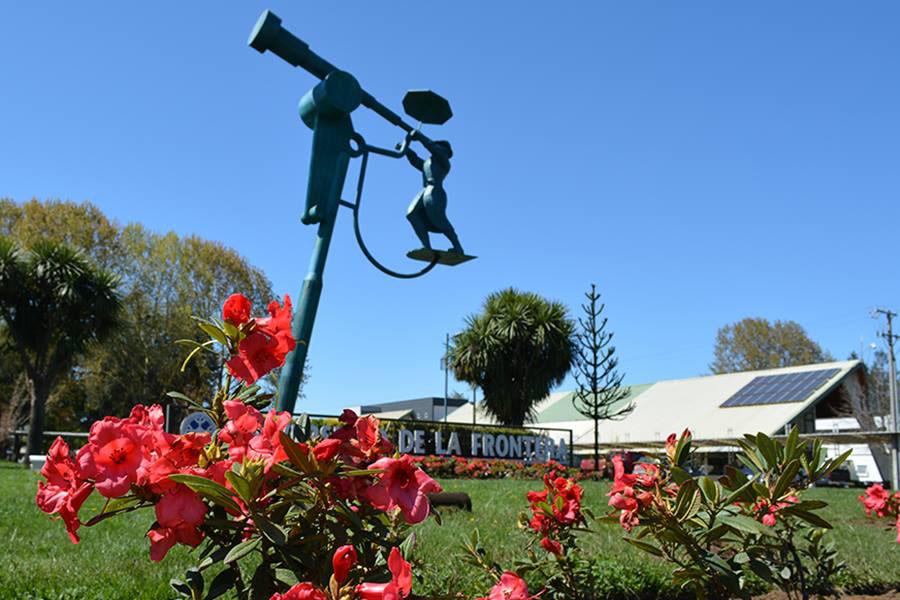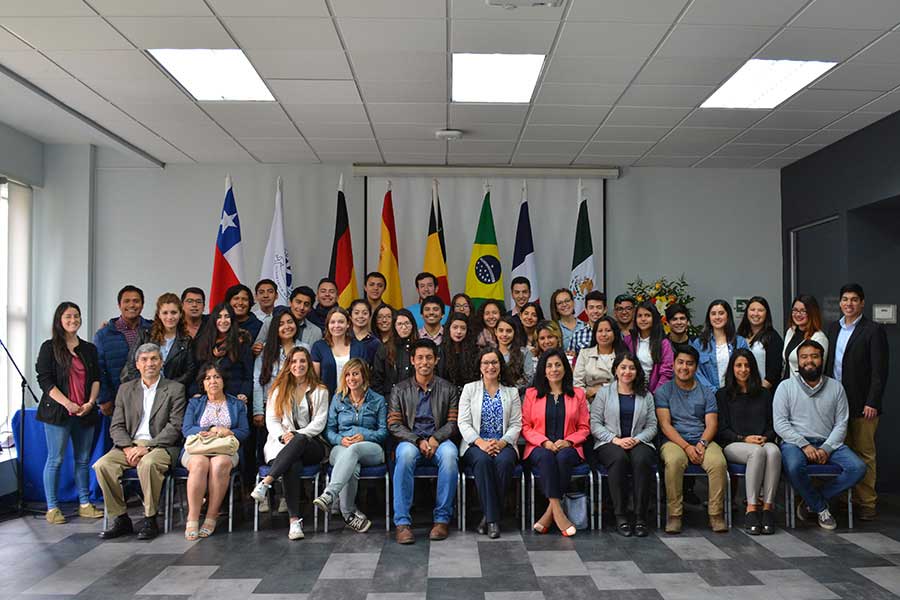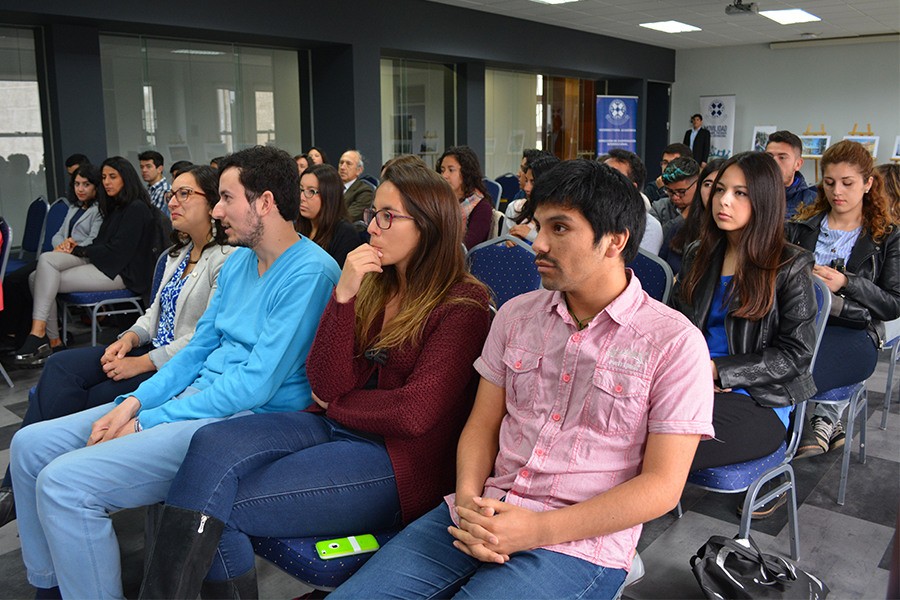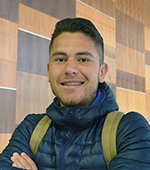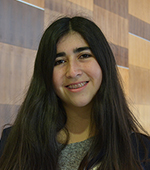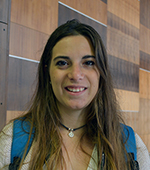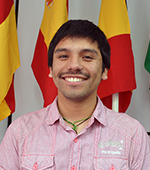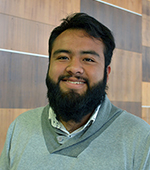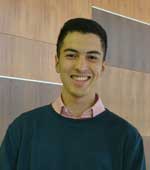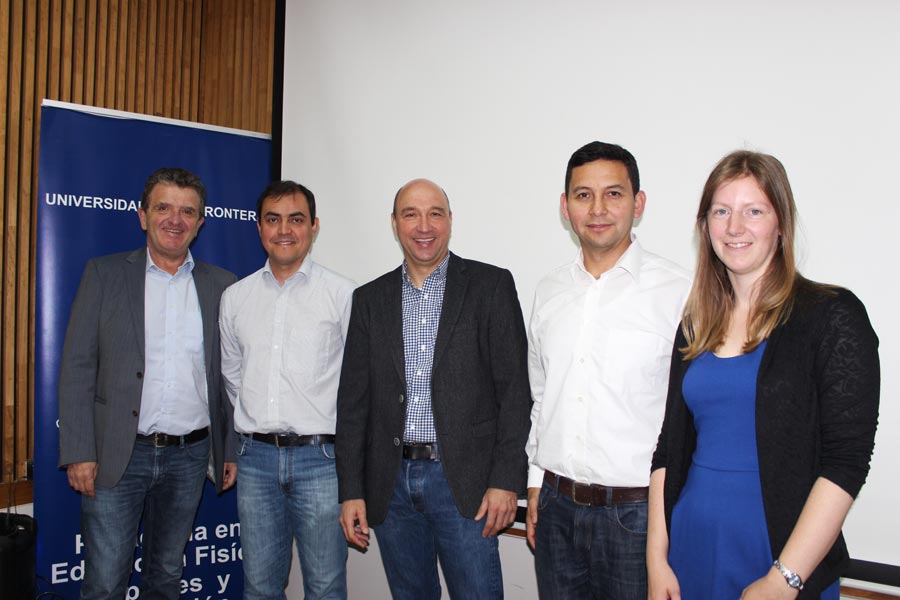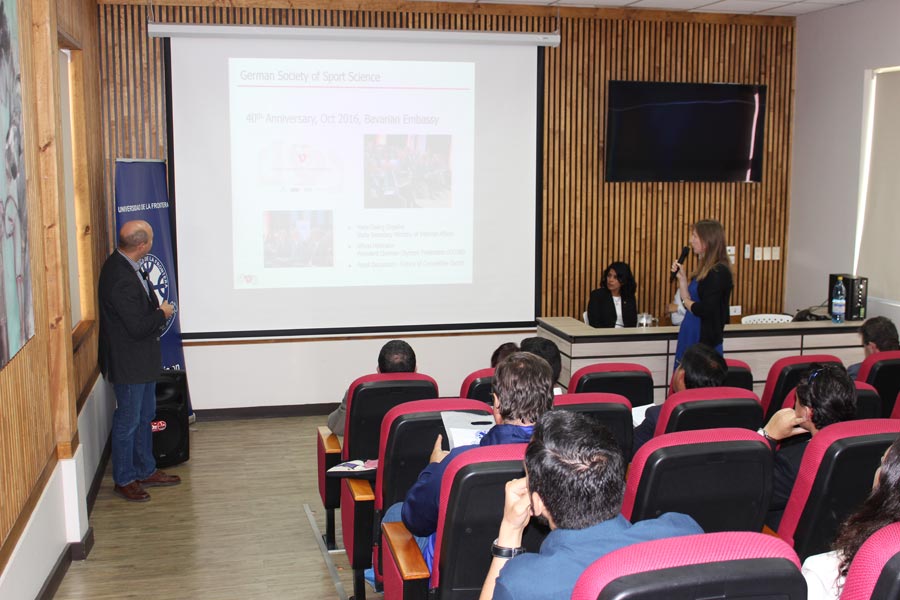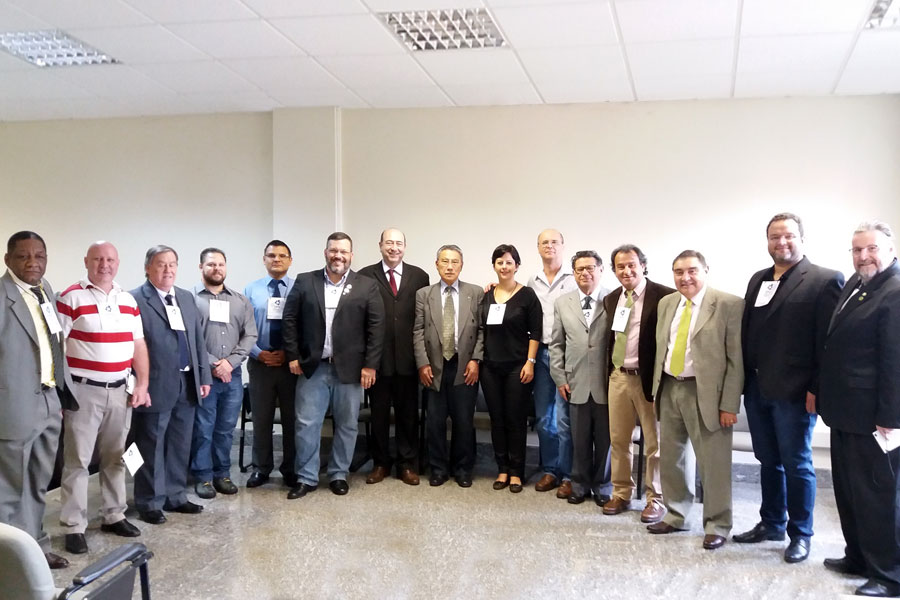|
For the first time, the UFRO accomplished to be in Group 4 of complex universities and is ranked in fourth place of this category. |
The University of La Frontera again achieved to be ranked in a highly important ranking in Chile. According to the Ranking of Quality of the Chilean Universities 2017, prepared by the Advanced Studies Group (GEA) Universitas and El Mercurio, for the first time, the UFRO enters Group 4 of Universities of Research and Doctoral Programs. “We are finishing this year with important institutional achievements that permit us to give an account of our management which is inspired by the constant improvement of quality standards and the increase in research and scientific productivity, which without a doubt reflects our performance, our management skills and the strengthening of leadership in the south of Chile”, the rector Sergio Bravo stated. This new list only includes universities that do research. They are situated in Group 3 or 4 and ranked by four indicators: publications per academic staff member (20%), citations per publication (30%), percentage of approved Fondecyt Projects (25%) and allocated Fondecyt funds per academic staff member (25%). With this consideration, the used indicators measure the scientific productivity, the perception of quality and relevance, and the publications and research projects of an institution made by its academic peers. The University of La Frontera is ranked in fourth place and stands out for the quantity of research funds per academic staff member. The ranking places this institution in Group 4 of Universities of Research and Doctoral Programs and in sixth place among the nine institutions of higher education. The composition of this group – that considers the establishments which offer seven or more doctoral programs in three or more different thematic fields – had not changed since this study parted in 2012. It is a milestone that new universities entered the ranking, what makes the high position of the University of La Frontera even more relevant. Another important step for the UFRO can be noted in the general ranking 2017, in which our institution climbed from ninth to eighth place at the national level, after showing remarkable indicators during the past twelve months in “student quality”, “academic staff members”, “training processes” and “institutional management”. GEA Universitas pointed the contrasting academic growth rhythm out that some state universities achieve. Among them is the UFRO, with consideration of its precarious beginning and bureaucratic obstacles, which did not slow down its development and progress. UFRO in Group 4 It is a major accomplishment for the University of La Frontera to enter Group 4, the group of “Universities of Research and Doctoral Programs”, what is a notable step for a young institution like ours. “The results show an enormous progress in the capacity to do research of the newest universities created after 1980”, El Mercurio quotes. Writtern by: Dirección de Comunicaciones
|
|
Germany and Chile strengthen their research links in sport and physical education at the UFRO |
This activity was part of an academic project of the Universidad de La Frontera (EXT17-0366) and organized by Dr. Jaime Carcamo of the Department of Physical Education, Sports and Recreation, who got his doctoral degree in Germany. One of the speakers was Dr. Lutz Vogt, Vice-president of the section of Health and Movement of the German Society of Sport Science (DVS), who presented the structure and functions of the German Society of Sport Science. Dr. Lutz Vogt spoke about the experiences and the influence the Society has on public sport policies in Germany. He stated that the Society is very important at the moment of decision-making and that “if in Chile all Associations that are linked to sport would work together and be represented by one voice, it would be possible to imitate the German model.” “When the Ministry of Education wants to draft a law, they ask the DVS for our opinion and what can be done. We are in direct contact with the Ministry of Education”, specified Lutz. UFRO GRADUATE IN GERMANY Another presentation was made by Javier Gonzalez who graduated from the UFRO in Physical Education Teaching, Sports and Recreation and is working on his doctorate in Sports Medicine at the Faculty of Psychology and Sports Sciences of the Goethe University Frankfurt in Germany, since six years. He said that when he arrived at the Institute for Sports Medicine, he realized that there were a lot of research lines. “The fastest and most specific one seemed to be the physical therapy in cancer patients. The universities work in strong collaboration with the clinics in order to be able to work with patients and do experimental research.” He added that “in Germany they use a holistic approach. When you study Physical Education there are two points of view: the scientific and the pedagogical side of sport. When you study Physical Education in Germany, you are also part of the clinical setting and working with patients. This is not the case in Chile.” According to him, this was the point he liked most about the doctorate he is doing in Frankfurt. He would like to incorporate that in Chile, too. Especially, because you can accomplish so much in cancer patients through sport. “The life expectancy of cancer patients (not the most aggressive types of cancer) increases from six to eight years and the sports therapy expert is the one who will accompany the patient, once the rehabilitation phase is over. And that is where the experts in physical education and movement come into play and get the main actors in this process.” GOALS Dr. Jaime Carcamo, one of the organizers of this event, met the speakers when he did his doctorate in Germany and managed to bring them together for this event at the UFRO, which met the objectives, according to him. “The Department of Physical Education, Sport and Recreation wants to create national and international networks. This is why we wanted to use the contact with our German peers and invited them to our University to learn about how sports science, physical education and other relevant topics are approached and developed in sports medicine in Germany”, Dr. Carcamo explained. Besides, he said that they “want the academic staff and students to hear about the possibility of academic exchange, as it was the case for me and Mr. Gonzalez.” Another presentation came from Dr. Winfried Banzer, the dean of the Faculty of Psychology and Sports Sciences of the Goethe University Frankfurt, Germany, who spoke about the importance of physical activity.
Written by: Nadia Arias
Faculty of Education, Social Science and Humanities |
|
Teachers of the Department of Basic Science of the UFRO Faculty of Medicine participated in the Histology Congress in Santiago de Compostela, Spain, and in a business meeting and an Anatomy and Experimental Biostructure Congress in Goiania, Brazil, at the beginning of November. |
After the meetings, the Department of Basic Science of the Universidad de La Frontera and the Department of Morphology of the Federal University of Goias (UFG) strengthened their International Cooperation Agreement, which is being processed by the International Affairs Office of the UFRO and the Cultural and Scientific Relations Office of the UFG. The organizers of these activities were the director of the UFRO Basic Science Department, Dr. Marco Paredes, and the director of the UFG Morphology Department, Dr. Paulo Cesar Moreira, in cooperation with UFRO scholars, Fernando Matamala, Enrique Olave, Ricardo Cornejo and Jorge Henríquez. It is worth mentioning that the work presented by the UFRO member, Dr. Enrique Olave, in the meeting in Brazil was awarded. VISITORS “In both meetings, we wanted to create links of cooperation, integration and collaboration. In Spain, we achieved to position our concept of experimental biostructure, which is a research line that we are developing with researchers in morphology and cellular and molecular biologists. We made contact with teachers of the Autonomous University of Madrid and Brazil who are going to visit Temuco in January 2018”, Paredes explained. The Federal University of Goias is a public university in Goiania, the capital of the Goias State in Brazil. It is the biggest university of that state, has about 23 thousand undergraduate, postgraduate and doctoral students, more than 30 doctoral programs in different areas of knowledge and more than 60 master´s programs. At the moment, there are no international agreements between the University of La Frontera and the Federal University of Goias. This is the first initiative in this area and does not interfere with other current cooperation initiatives with other universities. “We benefit from this agreement because it permits us to resolve some historical problems we had in the field of human anatomy, for example the access to bodies which are difficult to get in Chile. In this context, we could make a body donation agreement with the Brazilians, since they do not have this problem in Brazil”, added Paredes. SCOPES But the agreement also permits to advance when it comes to body preservation techniques. “We are using body preservation techniques that are not used anymore in the rest of the world. They are fixed in formalin and that generates toxicity for the person who is in contact with it (teachers, students, technicians). But in Brazil, they use techniques that are less toxic: the bodies are glycerinated and they will show us this technique and discuss the possibility of changing to this technique next year during the second semester.” The agreement with the Brazilian university covers the areas of technical exchange (the management of dead bodies), the possibility to create a postgraduate program in binational experimental biostructure, the exchange of undergraduate and postgraduate experiences and research “It is a big step for our Department to have the possibility to create new cooperations with the Brazilian and the Spanish university, since this will generate an increase the productivity and quality of our scientific publications through the inclusion of joint research lines. Our development plan considers the physical space we have, to aim at experimental biostructure and agreements for the development of young people and postdoctoral students that are related to this topic”, Dr. Marco Paredes concluded.
Written by: Fabian Aguirre
Faculty of Medicine |
Written by: Fabian Aguirre
Faculty of Medicine
|
The German agency AQAS (Agency for Quality Assurance) accredited the quality of two doctoral programs of BIOREN-UFRO at our University. This acknowledgment was the main challenge of the Performance Agreement of Internationalization of doctoral programs. Now, the challenge is completed successfully. |
“Accredited without conditions”. This is the highest acknowledgement of quality one can get at the international level. It means that there are no impediments at all to certify the quality of an academic program. And this is exactly what the doctoral programs in Natural Resource Sciences and Science with specialization in Applied Cellular and Molecular Biology of the Universidad de La Frontera achieved. Both programs went through the accreditation process during 2017, within the framework of the Performance Agreement of Internationalization, which this institution was developing since 2012 and whose main challenge was to obtain this quality assurance with European standards. Now, it has become reality, because the German agency AQAS decided to accredit “without conditions” – or observations – the quality of both doctoral programs. “We achieved this accreditation with European standards and very stringent protocols. This was the last aim left of the Performance Agreement. Now, the significant impact will show in the international projection of the University, the objective prove of the quality of the programs and the possibility to establish the bases for new partnerships and the development of postgraduate studies at the international level”, said the director of Institutional Analysis and Development, Ricardo Herrera. QUALITY ASSURANCE Compared to the national process, the international accreditation includes a visit of assessment experts who observe the declared conditions in the self-assessment report on site. “Five experts come to visit and stay for three days to observe everything. This is very important in terms of the verification on site of the programs´ quality”, Ricardo Herrera specified. He also added that the visiting experts were pleasantly surprised by the quality of the academic bodies, the impact of scientific production and above all, by the level of scientific equipment the University has and the way the access to it for the different research groups is resolved by the BIOREN platform. EQUIVALENCE WITH EUROPE For the director of the doctoral program in Natural Resource Sciences, Dr. Francisco Matus, the complete recognition without conditions is very important. “We are now accredited in the best way possible, without any objections by one of the most important accrediting agencies of Europe. This is a giant step for us, because it opens doors to that continent, since they can apply for our programs, because now they have the same standards as in Europe.” On the other hand, Dr. Matus states that – although the UFRO doctoral programs have a broad scientific network with worldwide centers of excellence – this achievement will permit to strengthen the international promotion of the doctoral programs through the same agency. He emphasized the strictness of the process of the visit and commented that one of the assessors was a doctoral student who can assess from the user´s point of view. Regarding the doctoral program, the director pointed out that they had put a lot of emphasis on the quality of the theses, the scientific indexes or impact factors, the academic staff and the empowerment of professors to guide the theses. “In this point, we have important restrictions. For example, our academic staff can only guide theses if they have had at least eight publications in five years or if they have conducted FONDECYT projects. This is just one example of how serious we take the postgraduate studies at this university”, Dr. Matus concluded. CONTINUOUS WORK This recognition is not a coincidence, but the result of permanent and hard work. This is how the director of the doctoral program in Science with specialization in Applied Cellular and Molecular Biology, Dr. Luis Salazar, describes it. “This is the culmination of extensive work that started in 2012, when we have been awarded a Performance Agreement of Internationalization. In other words, we have been permanently working on self-assessment during the last five years, what permitted us to significantly improve our indicators.” This Program increased its scientific productivity from 160 publications between 2008 and 2012 to more than 600 between 2013 and 2017, only by the academic team with 21 members. The last 40 graduates also contributed with 186 ISI publications from 2012 to 2017. At the same time, he pointed out that the international visitors evaluated the quality of the academic body, infrastructure and equipment. According to Dr. Salazar, an essential fact was also the student quality and the number of outside scholarships. In addition to that, the positive opinion of the students of the program and the increase in foreign students, with 28% of doctoral students from different Latin American countries, also played an important role.
Written by: Direction of Communications
|





